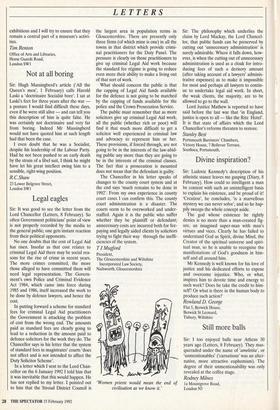Legal eagles
Sir: It was good to see the letter from the Lord Chancellor (Letters, 8 February). So often Government politicians' point of view is not properly recorded by the media to the general public; one gets instant reaction from their political opponents.
No one doubts that the cost of Legal Aid has risen. Insofar as that cost relates to criminal Legal Aid there may be social rea- sons for the rise of crime in recent years. The more crimes committed, the more those alleged to have committed them will need legal representation. The Govern- ment's own Police and Criminal Evidence Act 1984, which came into force during J985 and 1986, itself increased the work to be done by defence lawyers, and hence the cost.
In putting forward a scheme for standard fees for criminal Legal Aid practitioners the Government is attacking the problem of cost from the wrong end. The amounts paid as standard fees are clearly going to lead to a reduction in the amount paid to defence solicitors for the work they do. The Chancellor says in his letter that the system of standard fees in magistrates' courts 'does not affect and is not intended to affect the Duty Solicitor Scheme'.
In a letter which I sent to the Lord Chan- cellor on the 6 January 1992 I told him that it was inevitable that this would happen. He has not replied to my letter. I pointed out to him that the Stroud District Council is the largest area in population terms in Gloucestershire. There are presently only three firms (of which mine is one) in all the towns in that district which provide crimi- nal practitioners for the Duty Panel. The pressure is clearly on those practitioners to give up criminal Legal Aid work because the standard fee regime is going to reduce even more their ability to make a living out of that sort of work.
What should concern the public is that the capping of Legal Aid funds available for the defence is not going to be matched by the capping of funds available for the police and the Crown Prosecution Service.
The public must remember that as more solicitors give up criminal Legal Aid work, all the public (whether rich or poor) will find it that much more difficult to get a solicitor well experienced in criminal law and advocacy to represent him or her. These provisions, if forced through, are not going to be in the interests of the law-abid- ing public any more than they are going to be in the interests of the criminal classes. The fact that a prosecution is mounted does not mean that the defendant is guilty.
The Chancellor in his letter speaks of changes to the county court system and at the end says 'much remains to be done in 1992'. From my own experience in county court cases I can confirm this. The county court administration is a disaster. The courts seem to be overworked and under- staffed. Again it is the public who suffer whether they be plaintiff or defendant; unnecessary costs are incurred both for fee- paying and legally aided clients by solicitors trying to fight their way through the ineffi- ciencies of the system.
T J Mugford
President, The Gloucestershire and Wiltshire Incorporated Law Society, Nailsworth, Gloucestershire
'Women priests would mean the end of civilisation as we know it.'


























































 Previous page
Previous page